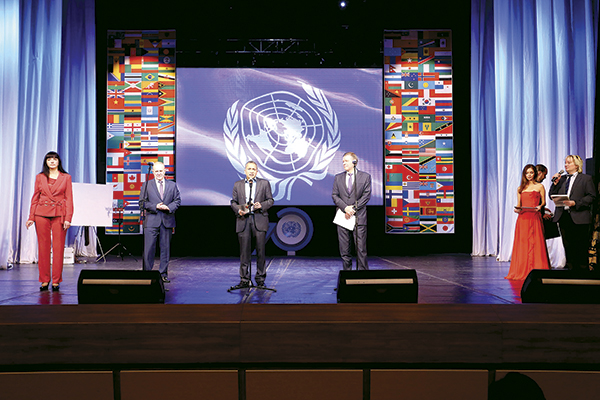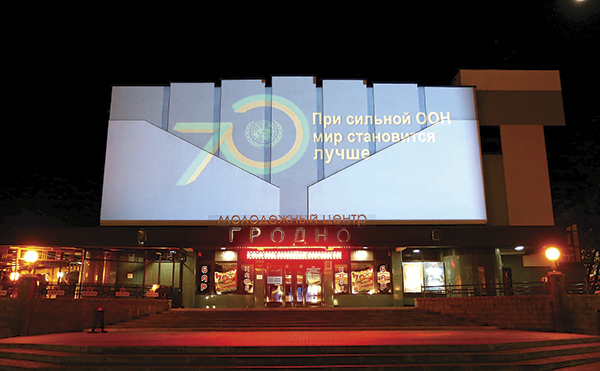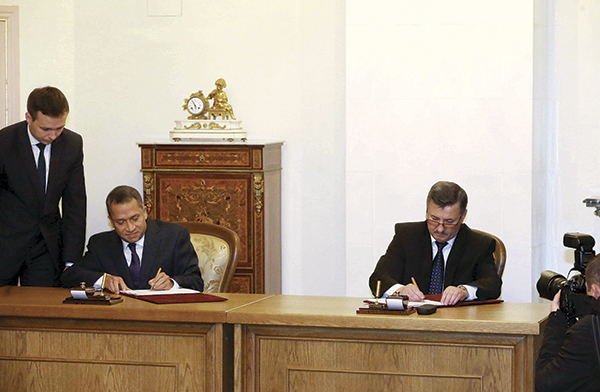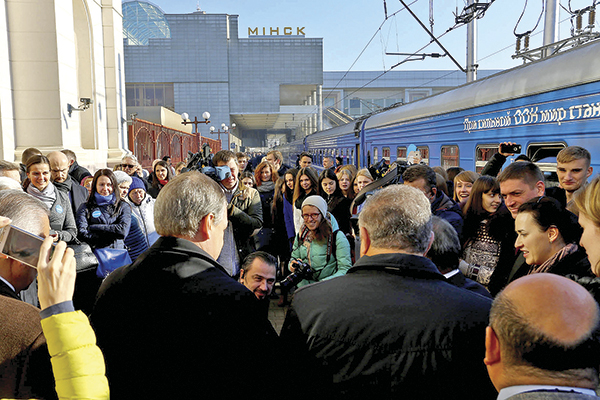
At the presentation of the UN concert in Grodno.
(From left to right) Representative of Grodno Regional Executive Committee Vladimir Kravtsov,
the UN Resident Coordinator in Belarus Sanaka Samarasinha and Deputy Minister of Foreign Affairs Valentin Rybakov
Almost three quarters of a century ago such a dream was born out of the ashes of the worst catastrophe the world had ever experienced. The dream became a cause because it was far greater than its source. The cause became a movement when it embraced diversity in the pursuit of a common purpose. The movement became a global transformation because it united peoples and nations in the quest for a better life for all. The United Nations 70 years ago was just such a dream.
The United Nations turned 70 on 24 October 2015, the day when its Charter came into effect. Belarus (the Byelorussian Soviet Socialist Republic) was one of the signatories of the UN Charter in June 1945. The organisation was founded following World War II:
• to save succeeding generations from the scourge of war, which twice in our lifetime has brought untold sorrow to mankind, and
• to reaffirm faith in fundamental human rights, in the dignity and worth of the human person, in the equal rights of men and women and of nations large and small, and
• to establish conditions under which justice and respect for the obligations arising from treaties and other sources of international law can be maintained, and
• to promote social progress and better standards of life in larger freedom.
But as wars continue to displace millions around us, poverty continues to permeate across continents, terrorism endangers the fabric of our global society, diseases spread easily across national borders and climate change threatens our very existence, one could be forgiven for wondering whether the determination of our forefathers that a global partnership would bring peace and prosperity to everyone is nothing but an unattainable and ill-defined aspiration. Despite many challenges though, and through much adversity “we the peoples” of the United Nations still zealously cling to the belief that what binds us together as one civilisation must be preserved at any cost. Survival of humanity depends on it. “A stronger UN, a better world” we say with conviction.
The United Nations has worked in Belarus since 1992. Currently there are eight resident agencies and a number of non-resident agencies working with Belarus to achieve its development agenda. The areas of work are expansive: climate change, environment protection and energy efficiency; migration and asylum; economic and local development; human trafficking and domestic violence; health, in particular HIV/AIDS/ TB and recently non-communicable diseases; child protection and responsible parenthood; democratic governance and human rights; Chernobyl Consequences, gender equality and much more.

Grodno Youth Center lits up in the UN blue color
Belarus as a founding member of the United Nations and one of its most robust proponents through both its words and its actions has helped to make the UN stronger on the global stage. At the same time, effective collaboration in-country between the UN and the Government and other stakeholders, combined with the generous support of other member states such the EU countries, Russia and the US has seen tangible benefits to some of the most disadvantaged and vulnerable populations in the country.
In September this year, on the eve of the 70th Anniversary of the UN, all the world’s leaders committed to achieve 17 Sustainable Development Goals (SDGs) by 2030. If achieved, they will bring transformational change of historic proportions to billions of us on the planet now, as well as untold future generations. Millions around the globe helped shape these goals through a conversation that defined a compact to create the world we want. Millions more now need to work together to make these goals a reality for those in need.
The idea came from the United Nations Conference on Sustainable Development — or Rio+20 Summit in 2012. It resulted in a focused political outcome document “The Future We Want” which contains clear and practical measures for implementing sustainable development.
In Rio, Member States decided to launch a process to develop a set of Sustainable Development Goals (SDGs) or Global Goals, which will build upon the Millennium Development Goals and converge with the post-2015 development agenda.
The Millennium Development Goals (MDGs) were the world’s time-bound and quantified targets for addressing extreme poverty in its many dimensions-income poverty, hunger, disease, lack of adequate shelter, and exclusion-while promoting gender equality, education, and environmental sustainability.
The SDGs replace the MDGs, which in September 2000 rallied the world around a common 15-year agenda. With the job unfinished for millions of people — we need to go the last mile on ending hunger, achieving full gender equality, improving health services and getting every child into school. The Global Goals aim to shift the world onto a sustainable path with 2030 as the target date.
The UN70 Belarus Express for SDGs was a shared dream of the UN and the Ministry of Foreign Affairs of Belarus. But, it too, like the UN itself has proven to be a dream far greater than its source. It is a dream we believe that shaped a cause through a myriad conversations among people who do not always talk to each other and has now prompted a vigorous movement that we believe will result in a robust partnership for sustainable and transformational development change for the people of Belarus and beyond.. We are determined that the SDGs for the people, by the people and of the people now could only be achieved if we jointly charter a course for its implementation. A mammoth national effort is needed if we are to leave no one behind in this noble but challenging venture. A change that brings peace, happiness and prosperity for people and planet.

Signing of the United Nations Development Assistance Framework for Belarus for 2016-2020
During the 8-day journey that commenced in Minsk on October 23 and finished on October 30 at the same destination, the UN 70 Belarus Express for SDGs visited seven cities and touched the hearts and minds of more than 150,000 people directly, while countless others were reached though media. The activities included film shows, theatre, musical concerts, sports events, talk shows, workshops, exhibitions, master classes, hackathons and even international cooking and diplomacy events and fashions shows dedicated to protecting bio-diversity.
Among many activities, some of the important events included the planting of a Tree of Peace and Sustainable Development by the President, opening of a historical exhibition about 70 years of partnership between the UN and Belarus, cancellation of a stamp dedicated to UN70, signing of the UNDAF 2016-2020, signing of a declaration in support of the SDGs and UNDAF by all the country’s Governors, launching of the UNDP National Human Development Report in Mogilev, screening of clips in cinemas about UN70 and SDGs, a travelling international cultural fair with the participation of member states and much more.
The United Nations Development Assistance Framework (UNDAF) for the Republic of Belarus for 2016-2020 is the second joint strategy of the UN organisations acting in Belarus. The UNDAF has been prepared by the United Nations Country Team in Belarus in consultation with the Government of the Republic of Belarus, civil society, private sector, vulnerable groups, and national and international partners, with the aim of promoting and protecting human rights and improving lives of the people of Belarus.
The strategic areas will set the main direction and scope of action of the UN development assistance to Belarus in cooperation with the Government over the next five years, and include:
• Inclusive, Responsive and Accountable Governance;
• Sustainable Economic Development;
• Environmental Protection and Sustainable Environmental Management Based on the Green Economy Principles;
• Sustainable Human Capital Development: Health, Education, Social Inclusion and Protection, Comprehensive Post-Chernobyl Development.
The UNDAF 2016-2020 will be implemented through a joint UNCT work plan, the country cooperation frameworks and programmes of individual UN agencies, as agreed upon with the Government and within the UNDAF context.
On October 24 a concert was held at Grodno Drama Theatre on the day of the 70th Anniversary of the UN with music and dance performances from more than 20 countries. The audience also heard real stories from people the UN serves like refugees, people with disabilities, people living with HIV, people fighting domestic violence and human trafficking and survivors of Chernobyl. At the same time, iconic Belarusian building like the National Library in Minsk and the Grodno Drama Theatre were illuminated in blue as part of the “Turn the World UN Blue” campaign. Among the famous landmarks taking part in this campaign were the Great Pyramids of Giza in Egypt, the statue of Christ the Redeemer in Rio de Janeiro, the Great Wall of China, Russia’s Hermitage Museum, and the ancient city of Petra in Jordan.
In each city we focused on different SDGs. Good Health in Grodno; Quality Education and Gender Equality in Brest; Reduced Inequalities in Gomel; No Poverty, Zero Hunger, Decent Work and Economic Growth, Sustainable Cities in Mogilev; Affordable and Clean Energy, Responsible Consumption and Production, Climate Action, in Vitebsk.
And so, both in a spirit of celebration remembering our rich 70 year collective past, but also in a spirit of reflection of the ambitious goals we have set for ourselves until 2030, we are grateful to those of you who undertook this historic journey around Belarus with us. But for those who didn’t make it, we still have a long road ahead of us and there is still time to hope on the “SDG train”.

A Warm Welcome to the Participants of UN70 Belarus Express For Sustainable Development Goals in Minsk
Everyone’s voice is important. Everyone’s dream must be celebrated. Everyone’s fears must be addressed. Everyone’s vulnerability must be recognised. Everyone’s potential contribution must be accounted. Through a mutually respectful dialogue that inherently seeks to understand each other, we will no doubt create a better world for our children than we found ourselves. The world we want through the United Nations we have.
As this amazing journey has come to an end in the capital city of Minsk we couldn’t help asking several questions to the inspirer and coordinator of the UN 70 Belarus Express for SDGs Sanaka Samarasinha, the UN Resident Coordinator/UNDP Resident Representative.
Q: Over the week in later October all Belarusians witnessed daily updates about unique initiative of the UN in Belarus — UN70 Belarus Express for SDGs. Why train? Where this idea came from?
A: More than 16 years ago when I started to work for the UN during my first week I found a book in my office about the Beijing Express. In 1995, 200 women travelled 8,000 kilometres aboard a half-kilometre-long train from Warsaw via Brest and Minsk to Beijing for the UN 4th Global Conference on Women. The whole initiative was organised by the UNDP. I was really inspired by the stories bonding and commitment to a single cause of those who joined the train. I told myself then, that one day I would launch a similar train. I didn’t know at that time to what it would be dedicated. I just love trains and I knew if we could get people to stay together for a few days, we would get to know each other and ourselves much better. Of course, none of this would have been possible if not for our main partners, the Ministry of Foreign Affairs, Belarus Railways, several line ministries and all the Regional Committees. The key sponsors from the private sector such as Mobile Tele Systems (MTS), Coco-Cola Inc., Priorbank, Renaissance Hotel Minsk, Hotel Minsk, EPAM Systems, Belarusian National Bank, Conte, “Event Studio BonBon”, Onega, “Slodych”, Samsung, “Soundcafe”, Nagesh, “Mulberry Club” and donors like Sida, Sharapova Foundation, USAID, International Trade Centre, Russian Federation Embassy, OSCE, EU, Global Fund, GEF, Envsec, Embassy of the Republic of Poland, and our information partners: TUT.by, Belta and First Belarusian National Channel. And, of course, our volunteers and the children have made a valuable contribution to the preparations and implementation of the UN 70 Belarus Express.
Q: Usually you have numerous events — seminars, workshops, trainings — conducted in Minsk. Why you decided to move in the regions this time?
A: The UN 70 Belarus Express for SDGs mission was to bring people together and to give them a chance to talk to each other. Given the diversity of people we were aiming to include, I knew some of these people would never have a chance to even sit and talk to each other, never mind get to know each other. Moreover, our goal was also to bring the UN and SDGs closer to people in Belarusian cities. These SDGs were defined by people not just experts and politicians. The whole world helped to shape them through many face-to-face consultations and something called the “My World” survey where people identified what kind of world they wanted to live in by 2030. More than 15,000 people in Belarus participated in these consultations and survey. If we are going to achieve these goals, we are all going to have to work together. Not just the Government and international organisations. That’s why it was important to discuss with as many people as possible around Belarus how we are going to set about this monumental, yet critical task.
Q: Who were the participants of your events in those regional centres?
A: We had thousands of participants from more than 40 countries. The President of the Republic of Belarus launched the whole initiative by planting a tree for Peace and Sustainable Development to mark the 70th Anniversary of the UN and presided at the signing of the UN’s Development Assistance Framework with Belarus for the next five years. Additionally, Ministers and other senior Government officials, parliamentarians, all the regional Governors, more than 100 NGOs, more than 25 private sector partners, more than 30 embassies, students, journalists, religious leaders from all faiths, artists and celebrities, representatives of vulnerable groups such as people living with disabilities, people living with HIV, victims of domestic violence and human trafficking, youth at risk, refugees and displaced persons and more than 240 UN staff from many agencies including the UN Secretary General’s Youth Envoy became a part of this truly historic journey.
Q. What next? Which will be the next steps after the UN70 Belarus Express for SDGs made its final stop in Minsk?
A: We need to get to work on the commitments we have made to ourselves and to each other. We have documented most of what has been said last week around the country about specific challenges and opportunities relating to different development goals. At the same time, each Governor of each Region signed a commitment to work together with the UN to achieve these goals by 2030. We will present the “voices of the people” to public officials of all levels at a conference in Minsk this month, where we will consider carefully then how the state and the UN will need to adjust what it does, where, when, with whom and how based on this feedback. At the same time, we will support Belarus in establishing a national mechanism to monitor progress on the implementation of the SDGs countrywide. This will include an interactive public engagement mechanism so that citizens can be fully involved in the development of their own communities and their country. The train was only the beginning!
By Victor Mikhailov
Photo by BELTA
Photo by BELTA











